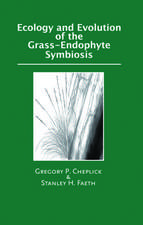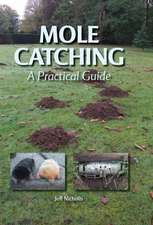The Behavioural Ecology of Ants: Developments Series
Autor J. H. Sudd, N.R. Franksen Limba Engleză Paperback – 23 aug 2014
| Toate formatele și edițiile | Preț | Express |
|---|---|---|
| Paperback (2) | 383.12 lei 6-8 săpt. | |
| SPRINGER NETHERLANDS – 23 aug 2014 | 383.12 lei 6-8 săpt. | |
| SPRINGER NETHERLANDS – 31 iul 1987 | 635.65 lei 6-8 săpt. |
Preț: 383.12 lei
Nou
Puncte Express: 575
Preț estimativ în valută:
73.32€ • 75.74$ • 61.02£
73.32€ • 75.74$ • 61.02£
Carte tipărită la comandă
Livrare economică 26 martie-09 aprilie
Preluare comenzi: 021 569.72.76
Specificații
ISBN-13: 9789401079044
ISBN-10: 9401079048
Pagini: 220
Ilustrații: X, 206 p. 28 illus.
Dimensiuni: 152 x 229 x 17 mm
Greutate: 0.3 kg
Ediția:Softcover reprint of the original 1st ed. 1987
Editura: SPRINGER NETHERLANDS
Colecția Springer
Seria Developments Series
Locul publicării:Dordrecht, Netherlands
ISBN-10: 9401079048
Pagini: 220
Ilustrații: X, 206 p. 28 illus.
Dimensiuni: 152 x 229 x 17 mm
Greutate: 0.3 kg
Ediția:Softcover reprint of the original 1st ed. 1987
Editura: SPRINGER NETHERLANDS
Colecția Springer
Seria Developments Series
Locul publicării:Dordrecht, Netherlands
Public țintă
ResearchCuprins
1 Social Behaviour as a Selfish Strategy.- 1.1 Kin selection.- 1.2 Inclusive fitness and sex ratios.- 1.3 Parental care and manipulation.- 1.4 The evolution of polygyny.- 1.5 Dominance hierarchies in workers.- 1.6 Cooperation and competition.- 2 The Phylogeny of Ants.- 2.1 The origin of ants.- 2.2 The subfamilies of ants.- 3 Ant Economics.- 3.1 Economies of scale.- 3.2 Colony life-history strategies.- 3.3 The flow of resources within the colony.- 3.4 Nest construction.- 4 Who does What, and When?.- 4.1 How ants are employed: how many tasks are performed in antcolonies?.- 4.2 Temporal polyethism: production lines based on an age-baseddivision of labour.- 4.3 Conflicts over the division of labour.- 4.4 Physical castes.- 4.5 The economics of caste ratios.- 4.6 Caste ratios and social homeostasis.- 5 Communication.- 5.1 Ant signals and language.- 5.2 Recognition of nestmates.- 5.3 Pheromonal communication.- 5.4 Communication in recruitment.- 5.5 Sex pheromones.- 6 Ants as Partners.- 6.1 Ants in the ecological community.- 6.2 Ants and plants.- 6.3 Ants and other insects.- 6.4 The cost-benefit balance in mutualism.- 7 Ants Exploiting Ants.- 7.1 Types of exploitation.- 7.2 The temporary and permanent parasitic ants.- 7.3 The evolution of inquilines.- 7.4 Slavery.- 8 Ant Ecology.- 8.1 Competition.- 8.2 Economics of territorial defence.- 8.3 Foraging for the most profitable prey.- 8.4 Ants as predators and prey: army ant foraging ecology.- References.
























